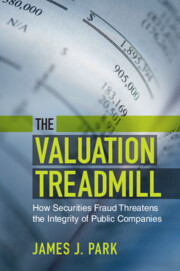Book contents
- The Valuation Treadmill
- The Valuation Treadmill
- Copyright page
- Dedication
- Contents
- Acknowledgments
- 1 Introduction
- 2 Xerox and the Pressure to Meet Projections
- 3 Penn Central and the Decline of Managerialism
- 4 Apple and the Controversy of Projections Litigation
- 5 Enron and Sarbanes–Oxley
- 6 Citigroup and the Financial Crisis of 2008
- 7 General Electric and the Problem of Earnings Management
- 8 The Future of Securities Fraud Regulation
- 9 Conclusion
- Notes
- Index
3 - Penn Central and the Decline of Managerialism
Published online by Cambridge University Press: 14 July 2022
- The Valuation Treadmill
- The Valuation Treadmill
- Copyright page
- Dedication
- Contents
- Acknowledgments
- 1 Introduction
- 2 Xerox and the Pressure to Meet Projections
- 3 Penn Central and the Decline of Managerialism
- 4 Apple and the Controversy of Projections Litigation
- 5 Enron and Sarbanes–Oxley
- 6 Citigroup and the Financial Crisis of 2008
- 7 General Electric and the Problem of Earnings Management
- 8 The Future of Securities Fraud Regulation
- 9 Conclusion
- Notes
- Index
Summary
[B]ig corporations do not lose money. John Kenneth Galbraith, 1967 Publicly held companies do not lose money. Stanley Goldblum, President of Equity Funding Corporation of America, 1969 Between the end of World War II and the start of the 1970s, regulators did not view securities fraud as a significant risk for large public companies. Major corporations often had market power in their industries and could be counted on to generate profits. They reinvested these profits in research and development and managerial training to perpetuate their advantage. They could acquire competitors or companies in unrelated industries to create new revenue streams. Investors trusted the competence of professional managers who would make wise decisions that avoided major disaster.1 Under this paradigm of managerialism, corporate managers were not as pressured by stock markets. There was thus little reason for an established public corporation to misstate its financial results. Even if it did, such a misrepresentation would be unlikely to hide serious problems that threatened a company’s solvency.
Keywords
- Type
- Chapter
- Information
- The Valuation TreadmillHow Securities Fraud Threatens the Integrity of Public Companies, pp. 33 - 49Publisher: Cambridge University PressPrint publication year: 2022

